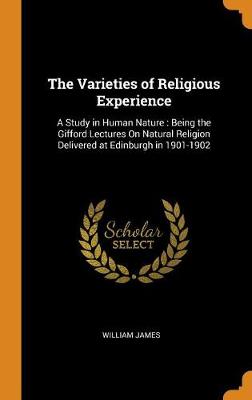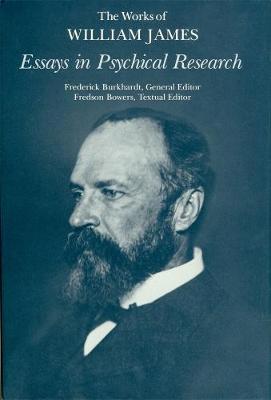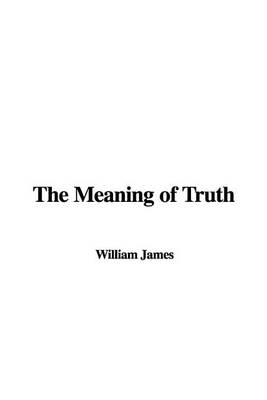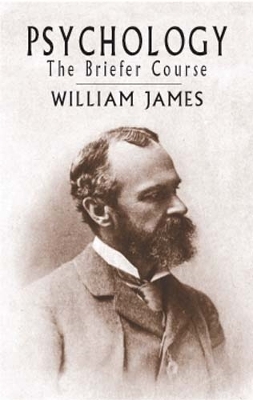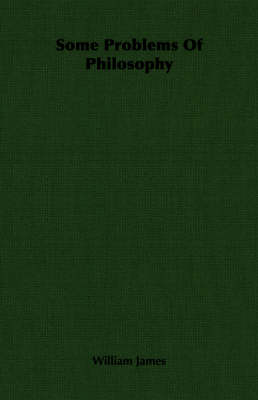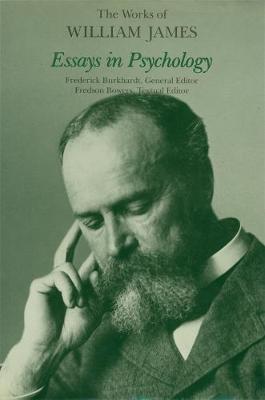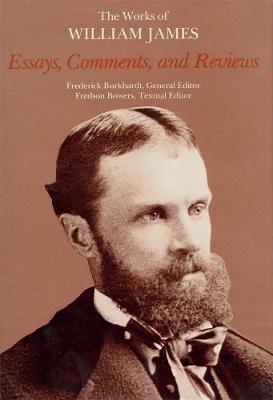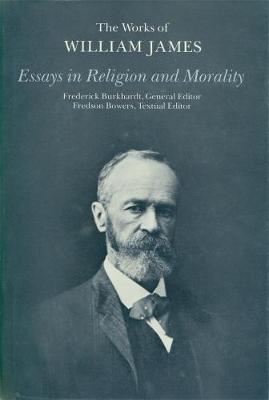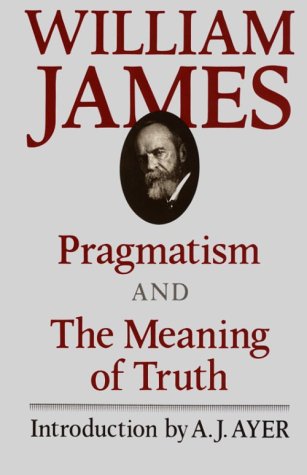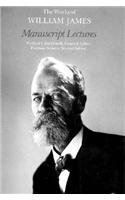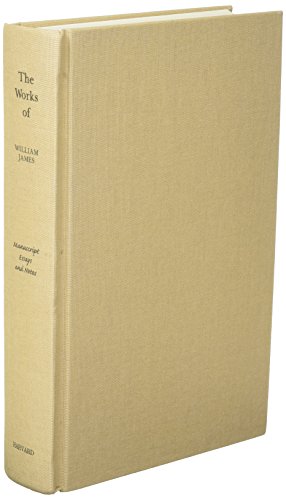The Works of William James
19 total works
During the preceding decade James, as he struggled with deep conflicts within his own philosophic development, had become increasingly preoccupied with epistemological and metaphysical issues. He saw serious inadequacies in the forms of absolute and monistic idealism dominant in England and the United States, and he used the lectures to attack the specific form that "vicious intellectualism" had taken. In A Pluralistic Universe James captures a new philosophic vision, at once intimate and realistic. He shares with his readers a view of the universe that is fresh, active, and novel. The message conveyed is as relevant today as it was in his time.
This is the fourth volume of The Works of William James in an authoritative edition sponsored by the American Council of Learned Societies. Prepared according to modern standards of textual scholarship, this series utilizes all available published and unpublished materials; its texts have been awarded the seal of approval of the Center for Editions of American Authors. Frederick Burkhardt is General Editor; Fredson Bowers, Textual Editor; Ignas K. Skrupskelis, Associate Editor.
Both the acclaim and outcry that greeted Pragmatism: A New Name for Some Old Ways of Thinking helped to affirm James's conviction. For it was in Pragmatism that he confronted older philosophic methods with the "pragmatic" method, demanding that ideas be tested by their relation to life and their effects in experience. James's reasoning and conclusions in Pragmatism have exerted a profound influence on philosophy in this century, and the book remains a landmark.
As Edward H. Madden points out in his substantial introduction, these essays, written over a span of seventeen years, represent not so much a fixed system of ideas as a patient searching, an organic development of James's thought in response to his own criticism and that of others.
This is the sixth volume to be published in The Works of William James, an authoritative edition sponsored by the American Council of Learned Societies.
Despite the modesty of its title, the publication of this book in 1899 was a significant event. It marked the first application of the relatively new discipline of psychology, and specifically of James's theses in The Principles of Psychology, to educational theory and classroom practice. The book went through twelve printings in as many years and has never been out of print. Among its innovative features were James's maxims "No reception without reaction" and "No impression without expression"; a new emphasis on the biology of behavior and on the role of instincts; and discussions of the relevance to elementary school education of what is known about will, attention, memory, apperception, and the association of ideas.
Appended to the fifteen talks to schoolteachers were three talks to college students, as pertinent today as when they were written: "The Gospel of Relaxation," "On a Certain Blindness in Human Beings," and "What Makes a Life Significant?"
Essays in Philosophy brings together twenty-one essays, reviews, and occasional pieces published by James between 1876 and 1910. They range in subject from a concern with the teaching of philosophy and appraisals of philosophers to analyses of important problems.
Several of the essays, like "The Sentiment of Rationality" and "The Knowing of Things Together," are of particular significance in the development of the views of James's later works. All of them, as John McDermott says in his Introduction, are in a style that is "engaging and personal...witty, acerbic, compassionate, and polemical." Whether he is writing an article for the Nation of a definition of "Experience" for Baldwin's Dictionary or "The Mad Absolute" for the Journal of Philosophy, James is always unmistakably himself, and always readable.
The publication in 1890 of William James’s acknowledged masterpiece marked a turning point in the development of psychology as a science in America. The Principles of Psychology also became a source of inspiration in philosophy, literature, and the arts. When John Dewey reviewed it, he predicted that it would rank “as a permanent classic, like Locke’s Essay and Hume’s Treatise.”
Its stature undiminished after 91 years, The Principles of Psychology appears now in a new, handsome edition with an authoritative text that corrects the hundreds of errors, some very serious, that have been perpetuated over the years. Prepared according to the modern standards of textual scholarship, this edition incorporates all of the changes James made in the eight printings he supervised, as well as the revisions and new material he added to his own annotated copy. In addition, all footnotes, references, quotations, and translations have been thoroughly checked.
The complete text of the Principles, with footnotes, drawings, and James’s own index, appears in Volumes I and II. Volume III includes extensive notes, appendixes, textual apparatus, and a general index.
The publication in 1890 of William James’s acknowledged masterpiece marked a turning point in the development of psychology as a science in America. The Principles of Psychology also became a source of inspiration in philosophy, literature, and the arts. When John Dewey reviewed it, he predicted that it would rank “as a permanent classic, like Locke’s Essay and Hume’s Treatise.”
Its stature undiminished after 91 years, The Principles of Psychology appears now in a new, handsome edition with an authoritative text that corrects the hundreds of errors, some very serious, that have been perpetuated over the years. Prepared according to the modern standards of textual scholarship, this edition incorporates all of the changes James made in the eight printings he supervised, as well as the revisions and new material he added to his own annotated copy. In addition, all footnotes, references, quotations, and translations have been thoroughly checked.
The complete text of the Principles, with footnotes, drawings, and James’s own index, appears in Volumes I and II. Volume III includes extensive notes, appendixes, textual apparatus, and a general index.
The more than fifty articles, essays, and reviews in this volume, collected here for the first time, were published by William James over a span of some twenty-five years. The record of a sustained interest in phenomena of a highly controversial nature, they make it amply clear that James's work in psychical research was not an eccentric hobby but a serious and sympathetic concern. James was broad-minded in his approach but tough-minded in his demand that investigations be conducted in rigorous scientific terms. He hoped his study of psychic phenomena would strengthen the philosophy of an open-ended, pluralistic universe that he was formulating during the same period, and he looked forward to the new horizons for human experience that a successful outcome of his research would create.
Robert A. McDermott, in his Introduction, discusses the relation of these essays to James's other work in philosophy, psychology, and religion.
The essays gathered in the posthumously published Essays in Radical Empiricism formulate ideas that had brewed in James's mind for thirty years as he sought a way out of the philosophical dilemmas generated by the new psychology of the late nineteenth century. They constitute the explanatory core of his doctrine of radical empiricism, a doctrine that charts his course between the absolute idealism he could not accept and, at the other extreme, the law of associationism, which reduces knowledge to sheer contiguity of ideas. In his introduction John J. McDermott describes the historical background and the genesis of James's theory and considers the objections raised by its opponents.
The Meaning of Truth shows James at his best-clear and readable as always, and full of verve and good humor. Intent upon making difficult ideas clear, he is also forceful in his effort to make them prevail.
Despite its title, the Briefer Course is more than a simple condensation of the larger work. For example, to the material from Principles James added several chapters on the physiology of the senses that helped mesh his psychology with the other sciences of the period. The earlier chapter title "The Stream of Thought" is replaced here with "The Stream of Consciousness." Psychology: Briefer Course remains a useful and highly readable introduction to James's views on psychology and is an essential source for anyone interested in studying all of his psychological writings.
This is the seventh volume to be published in The Works of William James, an authoritative edition sponsored by the American Council of Learned Societies.
The twenty-nine articles, essays, and reviews in this volume, collected here for the first time, were published by William James over a long span of years, from 1878 (twelve years prior to The Principles of Psychology) to 1906. Some are theoretical; others examine specific psychological phenomena or report the results of experiments James had conducted.
Written for the most part for a scholarly rather than a popular audience, they exhibit James's characteristic lucidity and persuasiveness, and they reveal the roots and development of his view on a wide range of psychological issues. As William R. Woodward notes in his Introduction, these essays "bring the reader closer to James's sources, thereby illuminating his indebtedness to tradition as well as his creative departure from it."
This generous omnium-gatherum brings together all the writings William James published that have not appeared in previous volumes of this definitive edition of his works. Miscellaneous and diverse though the pieces are, they are unified by James's style and personality, which shine through even the slightest of them.
The volume includes 25 essays, 44 letters to the editor commenting on sundry topics, and 113 reviews of a wide range of works in English, French, German, and Italian. Twenty-three of the items are not recorded in any bibliography of James's writings. Two of the new discoveries are of particular interest: dating from 1865, when he was still a medical student, they are James's earliest known publications and give his first published views on Darwinian biology, which was to affect profoundly his own work in philosophy and psychology. Among his reviews are one of "Ueber den psychischen Mechanismus hysterischer Phaomene," by Josef Breuer and Sigmund Freud, published a year after the first appearance of that historically famous essay, and showing the breadth of James's interests, reviews of George Santayana's Sense of Beauty (1897) and Bernard Berenson's Florentine Painters of the Renaissance (1896).
Essays in Religion and Morality brings together a dozen papers of varying length to these two themes so crucial to the life and thought of William James. Reflections on the two subjects permeate, first, James's presentation of his father's Literary Remains; second, his writings on human immortality and the relation between reason and faith; third, his two memorial pieces, one on Robert Gould Shaw and the other on Emerson; fourth, his consideration of the energies and powers of human life; and last, his writings on the possibilities of peace, especially as found in his famous essay "The Moral Equivalent of War."
These speeches and essays were written over a period of twenty-four years. The fact that James did not collect and publish them himself in a single volume does not reflect on their intrinsic worth or on their importance in James's philosophical work, since they include some of the best known and most influential of his writings. All the essays, throughout their varied subject matter, are consistently and characteristically Jamesian in the freshness of their attack on the problems and failings of humankind and in their steady faith in human powers.
Pragmatism is the most famous single work of American philosophy. Its sequel, The Meaning of Truth, is its imperative and inevitable companion. The definitive texts of both works are here available for the first time in one volume, with an introduction by the distinguished contemporary philosopher A. J. Ayer.
In Pragmatism James attacked the transcendental, rationalist tradition in philosophy and tried to clear the ground for the doctrine he called radical empiricism. When first published, the book caused an uproar. It was greeted with praise, hostility, ridicule. Determined to clarify his views, James collected nine essays he had written on this subject before he wrote Pragmatism and six written later in response to criticisms by Bertrand Russell and others. He published The Meaning of Truth in 1909, the year before his death.
These two works show James at his best full of verve and good humor. Intent upon making difficult ideas clear, he is characteristically vigorous in his effort to make them prevail.
This final volume of The Works of William James provides a full record of James's teaching career at Harvard from 1872 to 1907. It includes extensive working notes for lectures in more than twenty courses. Some of the notes contain summary statements of views of James's that have never been published before, such as his treatment of the question of proof in ethics, in the only course he ever taught in that subject; others reflect contemporary controversies in philosophy, notably the famous debate on Idealism and the nature of the Absolute; still others illuminate early stages of James's thinking on crucial problems in what was to become his philosophy of radical empiricism. Often the notes yield information about his sources that is not to be found in the published writings. Because James's teaching was so closely involved with the development of his thought, this unpublished material adds a new dimension to our understanding of his philosophy.
James's public lectures gained him world renown, and most of them were subsequently published. There are, however, several sets of notes for and drafts of important lectures that he never wrote out for publication; these are included in the present volume. Among them are his two series of lectures in 1878 on the physiology of the brain and its relation to the mind; the Lowell Lectures of 1896 on exceptional mental states; and the lectures of 1902 on intellect and feeling in religions, which were designed to supplement Varieties of Religious Experience and were intended to be his last word on the psychology of religion.
When William James died in 1910 he left a large body of manuscript material that has never appeared in print. Much of it is of biographical interest only, but the largest part is concerned with James's work. The present volume, the first of two that will bring The Works of William James to completion, includes the manuscripts devoted to work in progress on philosophical and psychological subjects. The last volume will bring together the manuscripts relating to James's public lectures and teaching.
The most important of these manuscripts are those of the years 1903 and 1904 called "The Many and the One." This was material for the book that James hoped would be the full technical exposition of his philosophy of radical empiricism. It contains discussions of problems and concepts that are not found in his published work. Closely related to this are his responses to the so-called Miller-Bode objections, which charged that his philosophy of pure experience could not solve the problem of the many and the one or the question "How can two minds know the same thing?" James's notes record his offers to work his way out of the impasse, which eventually led to his formulation of radical empiricism and his total rejection of the mind-body dualism that had dominated Western philosophy since Descartes.
The manuscripts in the rest of the volume contain James's reflections over a period of forty years in the form of drafts, memoranda, and notebook entries. The diverse subjects are arranged under the headings of Philosophy, Psychology, Aesthetics, Ethics, and Religion. Of special interest are the early notes in which James began to work out his own philosophical point of view.

